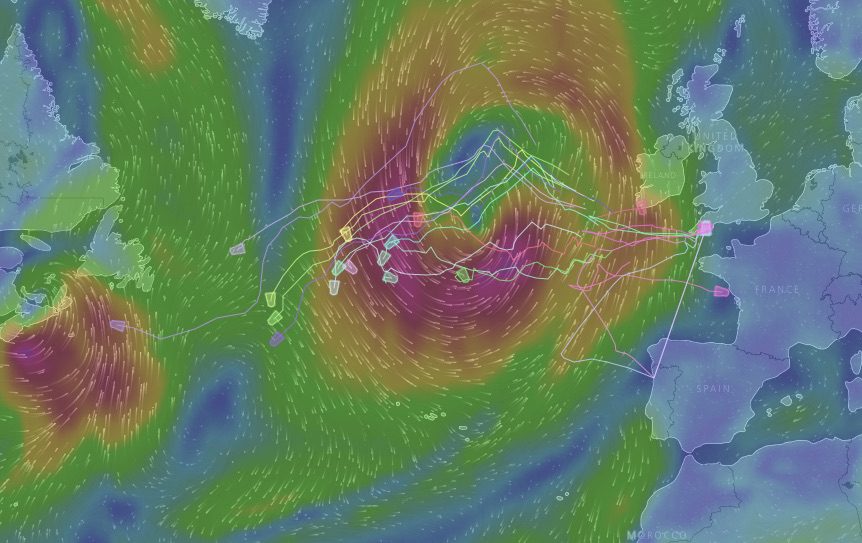Update 2 (June 10) – Below is an update provided by the Royal Western Yacht Club, which is hosting the trans-Atlantic race event. All sailors in distress are reported safe:
In the early hours of Friday 9th June, 60 knot winds and 15 metre seas were experienced by competitors, caused by a very low depression (967 mb). These extreme conditions caused damage to many boats with 3 emergency beacons (EPIRB) triggered. The Canadian coastguard in Halifax immediately reacted to the situation sending ships and air support to all the boats in distress.
The boats affected over the past 36 hours are:
TAMARIND – Suffered severe damage. Skipper well with no injuries. Rescued by Queen Mary en route to Halifax.
HAPPY – Dismasted. Both crew rescued by ocean going tug APL FORWARD. No injuries reported.
FURIA – Boat sunk. Crew resuced by survey vessel THOR MAGNA. No injuries reported.
HARMONII – Mainsail and track damage. Retired. Heading under engine for the Azores. Skipper ok, no injuries.
SUOMI KUDU – Mainsail problems. Retired. Heading back to UK. Skipper ok, no injuries.
All other competitors safe but still experiencing a 10 – 15 metre swell, no injuries reported.
The RWYC would like to thank all personnel at the Halifax Coastguard for their immediate and magnificent response to this emergency situation. All seafarers owe them a debt of gratitude.
Update (June 10) – An update from Canadian authorities said a fourth sailing vessel, with two crew members, has issued a distress call approximately 250nm from St. Johns, NL and is taking on water.
One of the three vessels reported in distress earlier has made its way out of the storm and is no longer in need of assistance. Meanwhile a merchant ship, one of two sent to assist the sailors, has successfully rescued two people from a second sailing vessel.
The cruise liner RMS Queen Mary II has been sent to attempt a rescue of the third yacht, and is expected to arrive later Saturday morning.
The three sailing vessels were located about 900nm from St. Johns when the distress calls were issued Friday. The vessels were reported to be spread out over an area of 150nm, requiring the assistance of multiple vessels.
The Canadian Coast Guard vessels Pearkes and Cygnus continue to make there way to the area along with the HMCS Charlottetown. Multiple aircraft with the Royal Canadian Air Force have been dispatched to the area. Canadian authorities have also requested the assistance of a P3 Orion aircraft from Portugal.
The four sailing vessels are among about 21 boats participating in a trans-atlantic OSTAR / TWOSTAR race organized by the Royal Western Yacht Club. The boats are all under 50-feet and crewed by one or two people.
 OTTAWA, June 9 (Reuters) – The Canadian military launched a rescue mission on Friday to reach several sailing vessels in distress in the mid-Atlantic after high seas and hurricane-strength winds disrupted a race from Britain to the United States.
OTTAWA, June 9 (Reuters) – The Canadian military launched a rescue mission on Friday to reach several sailing vessels in distress in the mid-Atlantic after high seas and hurricane-strength winds disrupted a race from Britain to the United States.
The defense ministry said it was “responding to distress calls from multiple sailing vessels,” coordinating efforts with marine rescue centers from the United States, Portugal and Britain.
A Canadian frigate and two coastguard ships, as well as two civilian tankers, were en route in response to calls from three yachts damaged by the storm, ministry spokesman Daniel Le Bouthillier said by e-mail.
“At least one vessel is dismasted, with others having rigging and or hull damage,” he said. The Canadian ships should arrive in 24 to 72 hours. Canada has also sent two long-range search-and-rescue aircraft.
The vessels, carrying one or two sailors each, were sailing from Plymouth, England to Newport, Rhode Island as part of the Royal Western Yacht Club’s single-handed and two-handed transatlantic race.
The three boats are single-hulled vessels under 50 feet in length and the crews are experienced, Le Bouthillier said. None of the sailors in trouble is Canadian.
The military said conditions in the mid-Atlantic remained difficult, with 10-15 meter (32-49 feet) seas and 50-70 knot (58-81 mph) winds. Sustained winds of 64 knots or greater are considered hurricane force.
Twenty-one vessels from about a dozen countries began the race, departing Plymouth on May 29, according to the yacht club’s website. The races are open to single and multi-hulled vessels between 27 and 60 feet in length. (Reporting by Andrea Hopkins and David Ljunggren; Editing by Alden Bentley and James Dalgleish)
(c) Copyright Thomson Reuters 2017.

 Join The Club
Join The Club











